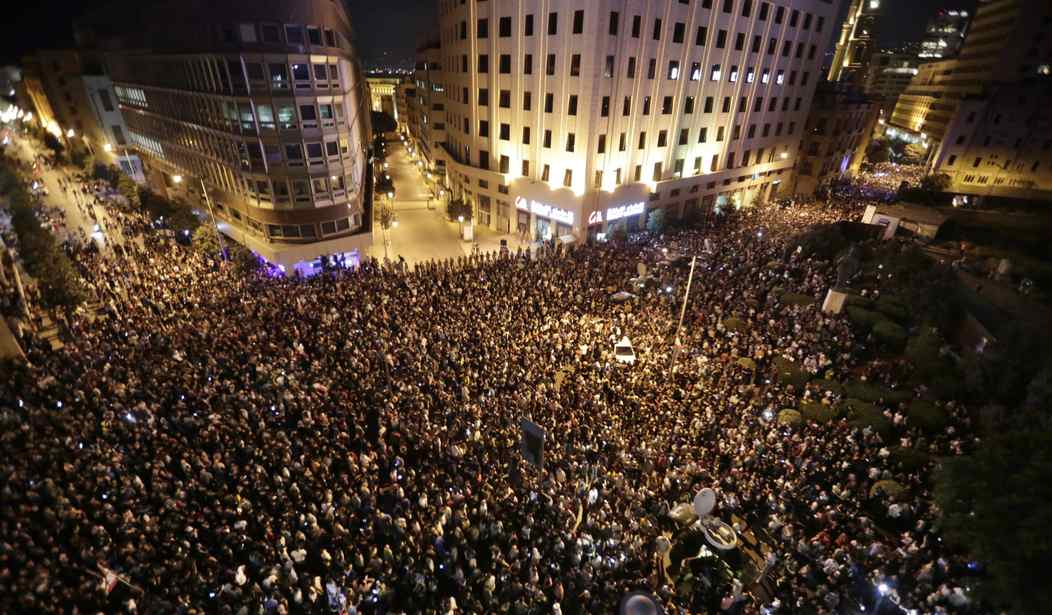Lebanese citizens took to the streets by the thousands yesterday to protest the government’s plan to impose a tax on the popular voice and text messaging app WhatsApp. They were the biggest demonstrations seen in many years and today, they erupted into violence.
Police fired tear gas and rubber bullets at demonstrators near the parliament building while the protesters set several fires in downtown Beirut. Protests in other cities were just as large and the outcry has forced the government to withdraw the planned tax.
But the tax on WhatsApp was only the last straw. The reaction was against the corruption and incompetence of the political class that has stood by while unemployment has risen to 30 percent, garbage piles up in the streets, and electric and water services are proving to be intermittent and unreliable.
A number of austerity measures have been implemented to make up for the accumulated failures of the different administrations that have presided over the small Mediterranean country in recent years.
Lebanon’s public debt is equal to around 150 percent of GDP, with officials desperate to lower that margin even if it is through tax increases that would further reduce disposable incomes and strain the economy.
Ordinary Lebanese have been slapped with increased income taxes, corporate taxes, value-added taxes and the tax on income earned from bank deposits, all the while economic growth has hovered near the one percent mark as unemployment surges to near the 30 percent [mark].
“It’s my first time protesting because I’m fed up. All this corruption is dragging the country into more poverty and we should finally speak up,” Aline Mahdi told An-Nahar. It’s not just corruption, although that might anger people the most. It’s also a sense that those in charge are incompetent and can’t get their act together. The current government took office in January after 9 months of bickering over cabinet positions.
Protests in Beirut keep growing. #lebanon pic.twitter.com/o6L8sSObdg
— Tamara Qiblawi (@tamaraqiblawi) October 18, 2019
In the end, whatever current problems there are in Lebanon, at bottom, this is a divided nation that cleaves along sectarian lines. Each sect — Christian, Sunni, and Shia — carefully divides power by divvying up the leadership. Christians get the largely ceremonial office of president, Sunnis get to name a prime minister, and the office of speaker of parliament is reserved for Shias. The arrangement is awkward because among all sects there are factions — pro-Syrian, anti-Syrian and especially, pro- or anti-Hezbollah. This factionalized arrangement does not serve the people from any religious background well.
Throw in massive corruption and you have the ingredients for a revolution — and civil war.
What we see now in Lebanon is more than just a handful of people saying that the present sectarian system, born as a compromise to seeking peace at the end of the civil war in 1990, simply doesn’t work.
The warlords who carved up the country and then built fiefdoms with their religious power are now, finally, acknowledged by hundreds of thousands to be the source of the crisis and not part of the solution.
The country is not functioning which is worrying Hezbollah as, quite apart from making it vulnerable to attack from Israel, a state of emergency does not play into the Iranian proxy’s hands like a lot of analysts believe.
One thing that won’t happen is an overthrow of Hezbollah’s power. The terrorists have the guns and the organization to use them. They have tolerated the sectarian division of power up to now, acceding to the popular will. But if these street protests begin targeting them, they won’t hesitate to brutally crush them.
Lebanon is small, but one of the most strategically important countries in the Middle East. It borders Israel and Syria, and historically has been seen as a crossroads in the region. Nominally pro-Western because of its large Christian minority, the growth of Shia Islam over the last 3 decades has gradually radicalized the country’s majority Muslim population.
And now pro-Iranian Hezbollah terrorists dominate. Politics aside, the people know that Hezbollah and Israel will go to war again soon. The question will be how the Lebanese people will react when Hezbollah once again drags their little nation into war.










Join the conversation as a VIP Member